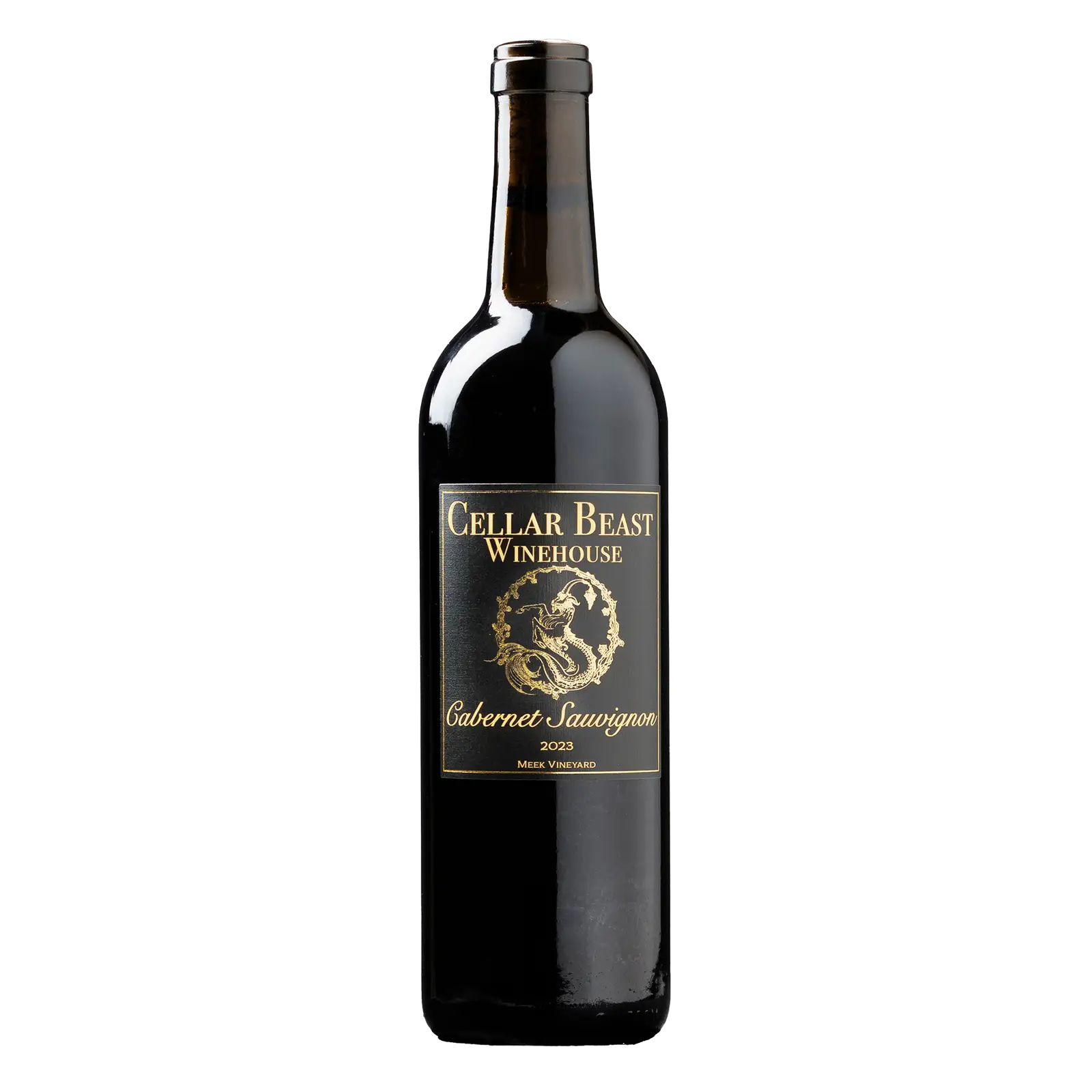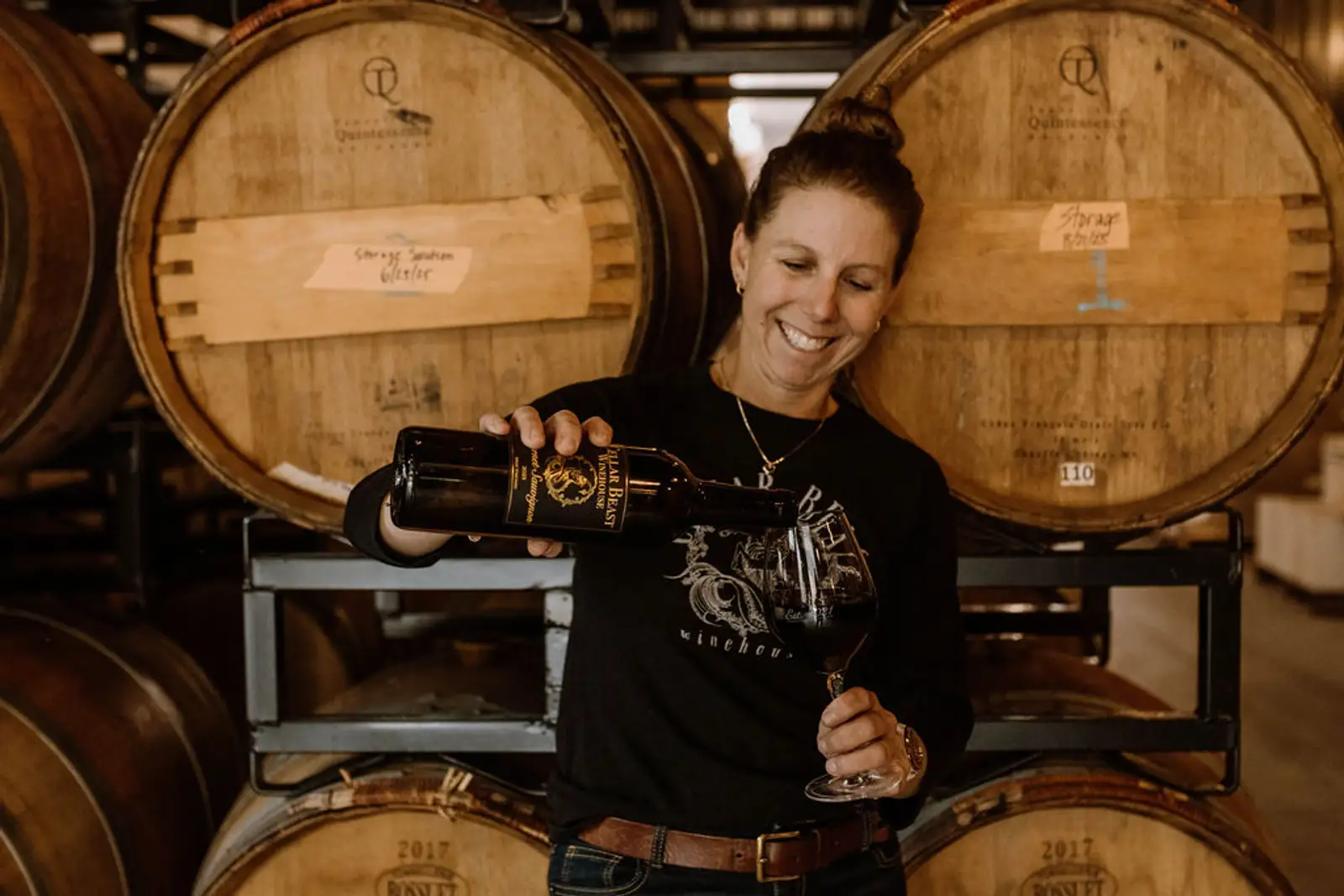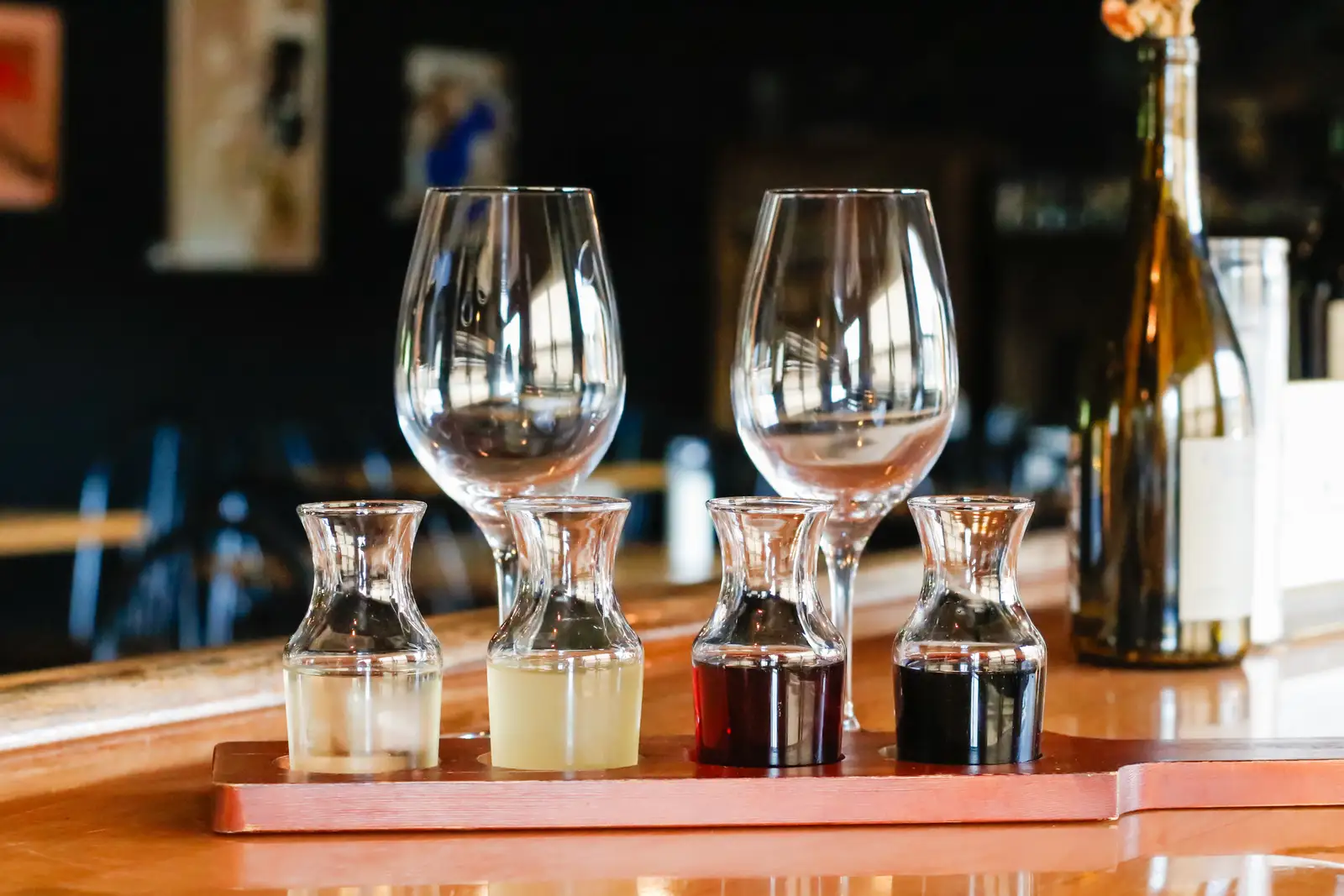Cabernet Sauvignon is a bold red wine known for its full body, firm tannins, and flavors of black currant, plum, and cedar. One of the most popular red wines in the world, it’s often aged in oak and pairs beautifully with grilled meats and hearty dishes. This guide breaks down what makes Cabernet Sauvignon unique—from its flavor profile to food pairings and winemaking origins.
By Cellar Beast’s winemaker, Aaron Gratch. With over a decade of winemaking expertise and a dedication to crafting wines that complement a wide range of dishes, Aaron provides pairing suggestions designed to enrich any occasion.
Where Does Cabernet Sauvignon Come From?
Cabernet Sauvignon comes from Bordeaux, France, where it’s often blended with Merlot, Cabernet Franc, and Petit Verdot to make the Left Bank Bordeaux wines that we know and love today. It is a natural cross between Cabernet Franc and the white grape Sauvignon Blanc, as detailed by Wine Enthusiast, giving this wine its characteristic tannic balance and vibrant acidity. Over the years, winemakers have come up with ways to highlight this variety’s full potential, and now, it is among the most revered and diverse varietals in the world.

Top Wine Regions for Cabernet Sauvignon
Although Bordeaux is the birthplace of Cabernet Sauvignon, it grows in many different regions, each with its distinct characteristics. Here’s a rundown of some areas, including Washington state, where Cellar Beast gets its high-quality Cabernet Sauvignon. According to OIV data, Cabernet Sauvignon is one of the most widely planted varietals in the world.
Bordeaux, France
The classic Bordeaux Cabernets are known for producing bold, structured reds with notes of blackcurrant, plum, tobacco, cedar and graphite.
Bordeaux is considered the birthplace of Cabernet Sauvignon, where it’s often blended with Merlot and Petit Verdot to create elegant, age-worthy reds. The cooler-climate region produces wines with firm tannins and earthy complexity.
Cellar Beast focuses on Washington-grown grapes, Bordeaux-style blending influences our approach to Left Bank-inspired wines like Midnight Archer.
Yakima Valley, Washington
Cellar Beast’s Cabernet Sauvignon comes primarily from the Meek Vineyard in Washington’s Yakima Valley. Yakima Valley’s cooler weather and soil diversity characterize Cabernet Sauvignon’s balanced structure, according to the Washington State Wine Commission. Our Yakima Valley Cab is laden with blackcurrant, plum, and spice, followed by moderate acidity and firm tannins. This vineyard’s unique microclimates produce a complex, elegant wine balanced with a hearty meal. Cellar Beast predominately sources from Meek Vineyard, run by Inland Desert and the Pontin del Roza Vineyard run by the Miller Family.
Red Mountain, Washington
Washington's Red Mountain Cabernets are bold, rich, and full of intense dark fruit flavor with earthy undertones.
Known for its warm days and iron-rich soils, this Washington AVA yields bold Cabernets with intense blackberry and herbal spice character. At Cellar Beast, we use Quintessence Vineyard Cabernet from Red Mountain in our Midnight Archer blend, where it brings structure, depth, and a true sense of place.

Candy Mountain, Washington
One of California's smallest and newest appellation's. Candy Mountain produces Cabernet Sauvignons with bold black fruit, firm tannins, and elegant mineral complexity.
Candy Mountain is rapidly gaining a reputation for producing high-quality Cabernet. Like Red Mountain, it shares a warm, sunny climate with well-drained gravel soils ideal for full grape ripening. Resulting in rich, layered wines with concentrated dark fruit and a refined, ripe structure.
Though limited in size, Candy Mountain AVA’s Cabernets deliver a balance of power and poise—making it one of the most exciting emerging terroirs for red wine lovers.
Napa Valley, California
Califonia's Napa Valley Cabernet Sauvignon is rich, ripe, and full of bold black fruit, vanilla, and oak spice flavors.
Napa Valley is renowned as one of the most famous wine-production areas in the world. Its great climate allows Cabernet grapes to ripen to perfection. It produces full-body wines renowned for intensity, their character, and age-ability. Dark cherry, plum, and blackberry tastes are blended with toasted oak and vanilla tastes imparted by barrel-aging. The silkiness in textures, rich fruit character, and ability to impress youth and age are all contributing factors to the popularity and love for Napa Cabs among wine consumers worldwide.
Chile
Because of Chile's Mediterranean climate, Cabernet Sauvignons from the Maipo Valley produce wines with intense red fruit, herbs, and an elegant, accessible structure.
Stellenbosch, South Africa
South Africa, in particular Stellenbosch, has become a premier producer of excellent Cabernet Sauvignon. The world-famous wine-growing region of Stellenbosch, located just east of Cape Town, has diverse microclimates and soils that give rise to complex, full-bodied Cabernet Sauvignons.
Stellenbosch Cabernets are known for their unique flavors, which include flavors of black currant, black plum, and cassis, as well as eucalyptus or mint. Many Stellenbosch growers age their wines in oak, which brings tobacco, black pepper spice, and cedar undertones to their cab wines. The warm days and mild sea breezes help the ripening process, allowing Cabernet Sauvignon to release rich fruit flavors balanced by acidity and soft tannins.
South African Cabernet Sauvignons represent the grape in a unique way that combines New World fruitiness with Old World refinement and poise. For anyone wanting a new take on Cabernet, Stellenbosch’s wines are an exciting and memorable palate experience.
Cabernet Sauvignon: Taste, Tannins, and Traits
What makes Cabernet Sauvignon so appealing to both winemakers and consumers? Here are some hallmark traits:
- Bold Structure and Tannins: Cabernet Sauvignon's firm tannins will keep it intact for years, making it an ideal cellar wine, as described in Decanter’s guide.
- Complex Fruit Profile: Dark fruit characters like blackcurrant, blackberry, and cherry tend to be typical characteristics of Cab Sauv, though they vary a bit depending on the region.
- Aging Potential: As the sturdy Cabernet Sauvignon aged, its leather, cedar, and tobacco flavors became more complex. Tannic wines like Cabernet Sauvignon have a greater ability to improve with age as their tannin content breaks down over time.
- Adaptable Style: The grape is equally effective as a single-varietal wine and as a blend, enabling the winemaker to exploit various variety features.
Explore our premium Cabernet Sauvignon for a rich, full-bodied experience.

Tasting Cellar Beast’s Cabernet Sauvignon
Meek Vineyard Cabernet Sauvignon – Yakima Valley, WA
Our Meek Vineyard Yakima Valley Cabernet Sauvignon is an ideal example of Washington State’s ability to produce premium Cabernet. This wine offers rich dark fruit flavors like blackcurrant and plum flavors with a touch of spice and acidity. Meek Vineyard’s excellent conditions and different soil types make this Cab beautiful and refined – a perfect companion to hearty meals.
With its dark fruit, well-tuned acidity, and subtle spices, our Yakima Valley Cabernet Sauvignon pairs nicely with foods emphasizing savory umami flavors and hearty textures.
- Prime Rib or Ribeye Steak: This Cabernet Sauvignon's dry tannins and dark fruit aromas accent the savory depth of succulently well-marbled meat. You can serve it with a rosemary garlic dressing to offset the wine’s mineral notes., according to Food & Wine.
- Wild Mushroom Risotto: The acidity and a bit of spice complement the earthy flavors of the mushrooms beautifully. To make the wine more decadent, add some parmesan or truffle oil.
- Aged Cheddar or Gouda: Aging cheeses impart a pungent, sharp taste that pairs well with the fruitiness and firm tannins of the wine.
Continue reading our guide on cheese pairings for wine here.
Quintessence Vineyard Cabernet Sauvignon – Red Mountain, WA
Red Mountain’s Quintessence Vineyard Cabernet Sauvignon is a powerful, ripe fruit style of Cabernet Sauvignon. This deep, complex wine is grown on Red Mountain’s iron-clad slopes, and its aromas are of blackberry, black cherry, and bitter herbs. Quintessence Cabernet is incorporated in our Midnight Archer blend, whose robust structure brings richness and substance to this French oak barrel-aged Left Bank Bordeaux-style red. Midnight Archer blends Quintessence Cabernet, Merlot, and Petit Verdot to bring the style of Bordeaux to the bold fruit-forward character of Washington state.
Our Quintessence Vineyard Cabernet Sauvignon from Red Mountain, with its fruit notes of rich blackberry, cherry, and herbal character, graces Midnight Archer’s Merlot and Petit Verdot combination. The heft of this wine suits food pairings with bold, spicy foods that match its heavy-bodied structure and multi-layered intensity.
- Lamb Chops with Herbs de Provence: The herbs and juicy meatiness of lamb balance the richness of Quintessence Cabernet. It highlights the dark fruit and nutmeg of the wine.
- Beef Stew with Root Vegetables: Slow-cooked beef and root vegetables such as carrots and potatoes mimic the richness and depth of the wine, while the stew’s rich flavors enhance its tannic balance.
- Bittersweet Dark Chocolate: To create a unique dessert accompaniment, choose a dark chocolate high in cocoa (about 70%) as a food pairing with an intense wine like Midnight Archer. Fruit and spice in the wine tame the chocolate’s bitterness, making a great end to any meal.
- ➔ Order Cellar Beast Cabernet Sauvignon Reserve
- ➔ Order Cellar Beast Midnight Archer
Why Cabernet Sauvignon Deserves a Spot in Your Cellar
If you’re a fan of Cabernet Sauvignon, Cellar Beast’s favorite wines from Washington’s Meek and Quintessence Vineyards are a perfect way to taste the fruit’s depth and beauty. These wines, from the lush, balanced Yakima Valley Cab to the bold, structured Red Mountain Quintessence Cab in Midnight Archer (also complementing the green bell pepper notes of the small blend of Carmenere), embody the flexibility and complexity that Cabernet Sauvignon offers. Check out our wines online and experience Washington’s finest Cabernets at your table. Learn more about food pairings in our Food Pairing Blog Series.
Enjoy unforgettable wines and experiences by joining wine club!
Drawing on insights from trusted wine and culinary authorities, including the Wine & Spirit Education Trust and Wine Folly, this guide ensures accuracy in each pairing recommendation. While Cellar Beast wines are highlighted, the guidance is crafted for all wine enthusiasts seeking to elevate their meals.
Explore Cellar Beast’s Wines: Browse our curated wine selection here. For personalized pairing advice or any questions about our wines, please reach out to us.
References:
- Origin of Cabernet Sauvignon
- Source: Wine Enthusiast - “The History of Cabernet Sauvignon” and "The Story Behind Cabernet Sauvignon"
- Source: Wine Enthusiast - “The History of Cabernet Sauvignon” and "The Story Behind Cabernet Sauvignon"
- Global Popularity and Acreage
- Source: OIV (International Organisation of Vine and Wine) Statistics
- Source: OIV (International Organisation of Vine and Wine) Statistics
- Yakima Valley Terroir
- Source: Washington Wine
- Flavor Profiles and Tannin Structure
- Source: Decanter
- Aging Potential of Cabernet Sauvignon
- Source: Wine Folly
Next Reads: Take Your Cab Knowledge Out of 101
You’ve nailed the basics. Now move from “I know what Cab is” to “I know exactly which Cab to pour and why.”
- Cabernet Sauvignon Grape: Flavor, Tannin & Color Profile – Get granular on structure so you can predict how a Cab will feel in your mouth before you open it.
- Cabernet Red Wine Guide: Taste, Pairings & Best Bottles to Buy – Connect Cab to the broader red wine landscape and see where it really shines.
- Is Cabernet Sauvignon Sweet? Understanding This Bold Red Wine – Clear up the sweetness confusion so you can explain it to anyone at the table.
- Cab Sauv Uncorked: Bold Flavor, Perfect Pairings, and Cellar Beast Favorites – See how Cellar Beast turns theory into real bottles and pairings.
- Best Dry Red Wines to Try in 2025 with Pairing Tips & Top Picks – Put Cab next to other dry reds you should be drinking this year.
This is how you move from “Cab curious” to “Cab reliable.”





